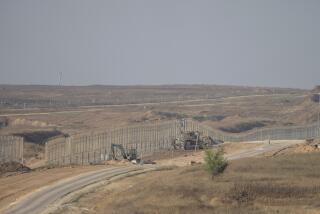Baghdad bombing kills at least 61, injures more than 160
BAGHDAD — A bomb in a sprawling Shiite Muslim neighborhood of Baghdad killed at least 72 people Wednesday and wounded more than 135, highlighting the danger of Iraq slipping back into violence after the deadline for U.S. combat troops to leave its cities -- now less than a week away.
It was unclear who was responsible for the bomb, which was hidden in a motorcycle with a vegetable cart attached. Some blamed Sunni Muslim insurgents with Al Qaeda in Iraq or remnants of Saddam Hussein’s Baath Party, but others raised the possibility that the bombing was the result of disputes among Shiite factions.
In either case, such bloodshed presents a major challenge for Prime Minister Nouri Maliki.
Maliki, a Shiite, has asserted that Iraqi forces are ready to take on responsibility for security with limited help from the U.S. military. His government has declared a national holiday on June 30, the deadline for U.S. troops to pull back from the cities.
Maliki has warned that there will be attacks in the days ahead, but insists that Iraqi forces are up to the task. Last week, the senior U.S. military commander in Iraq, Army Gen. Ray Odierno, expressed confidence in the Iraqi army and police.
Some U.S. soldiers are expected to remain at bases in Baghdad and other cities to serve as advisors, but the sides are still negotiating the size of the force, rules and locations. President Obama has set August 2010 as the deadline for U.S. combat troops to leave Iraq, and under a U.S.-Iraqi security agreement signed last year, all U.S. forces are expected to leave Iraq by the end of 2011.
The attack Wednesday occurred at the entrance to the popular Muraidi market in the Sadr City neighborhood, home to 2.5 million people, a police official said. Casualty figures were provided by medical officials. The blast followed a suicide truck bombing Saturday in Taza Khurmatu, a Shiite Turkmen town in northern Iraq, which killed at least 70 people.
The drawdown of U.S. forces, coupled with national elections scheduled for January, has raised fears that with the American era here drawing to a close, bloodshed could once more increase as sides vie for control.
In a country emerging from sectarian war, where political parties often have ties to paramilitary groups, violence is certain to fuel suspicion.
Sheik Fatih Kashif Ghitaa, a Shiite cleric who runs Al Thaqalayn Center for Strategic Studies, which has ties to the country’s ruling elite, says the American effort to ease out of Iraq could end in failure.
“Now they would like to withdraw as rushed as they came,” Ghitaa said this month. “Suddenly, they say, ‘Build your own democracy,’ when we face multiple problems: some in security, some with economics and some with corruption.”
Ghitaa said that armed Sunni Arab groups were bound to challenge the government and that officials had mostly squandered an opportunity to reconcile with former Sunni insurgents, who had turned on Al Qaeda in Iraq, by failing to provide them with real job opportunities.
“Al Qaeda will return to them and say, ‘They gave you nothing,’ ” Ghitaa said.
In Sadr City, residents reeled from the blast in the market, which sold pigeons, hens and geese.
“We come here every day. We sell and buy birds. It was the peak hour. Suddenly there was a huge burst of fire and smoke. I was 70 meters away. My hand was injured by shrapnel,” said Haitham Ali, a 37-year-old merchant.
“Most of the wounded were young men. There were women and children as well.”
Market stalls were set ablaze. Volunteers carried out wounded children; some of the injured were taken out on carts. Others had their limbs blown off, Ali said.
Concrete barriers, which are common around Baghdad neighborhoods to ward off such attacks, were positioned around the market in April, when a pair of car bombs rocked the same strip.
For the last year, the Iraqi army has policed Sadr City and hemmed in radical Shiite cleric Muqtada Sadr’s Mahdi Army militia, which once controlled the district. The bombing was sure to embolden supporters of the militia, who want the group’s fighters once again to assume control.
Residents described U.S. military helicopters buzzing overhead, and said Iraqi soldiers were firing wildly after the blast.
“They are opening fire randomly in a frightening way. It’s causing confusion and fear among citizens. They did the same thing after the bombing of late April,” said Ahmed Majid, a 35-year-old employee at the Water Ministry. Majid accused Shiite political parties in the government of being behind the attacks.
“I’m sorry that the big bombings are coming back and accompanying the withdrawal of the U.S. forces. It seems that the Iraqi forces are unable to maintain security at all,” he said, adding that he thought Shiite parties affiliated with Iran were behind the attack.
The district’s mayor, Hassan Karim, said that Al Qaeda in Iraq or the Baath Party was behind the explosion.
However, a member of the district’s local council, speaking on condition of anonymity, said he believed the bombing could be linked to a power struggle among Shiite factions. He refused to say which side he thought was responsible but said violence had been rising in Sadr City, including a spate of smaller bombings and killings.
“I’m not of the opinion the attack was Baathist or Qaeda,” the council member said. “It was Shiite.”
--
Hameed is a Times staff writer.
More to Read
Sign up for Essential California
The most important California stories and recommendations in your inbox every morning.
You may occasionally receive promotional content from the Los Angeles Times.










